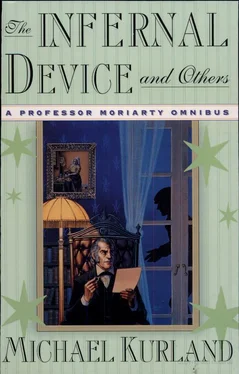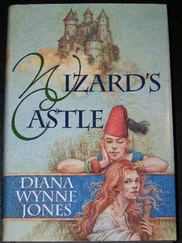"You saw him at home?"
"Yessir. At least, until about one in the morning when the interior lights was turned off in the house."
"I see," Holmes said. "That's good to know."
"Clears him of suspicion, does it, sir?"
"On the contrary," Holmes said. "It makes me more suspicious than ever. Far more suspicious. Exactly what do you mean when you say you saw him?"
"We did, sir. Just that. At his window."
"I see. Which window was that?"
"Ground floor, Mr. Holmes. Facing Russell Square. To the right of the door."
"The study window?"
"If you say so, Mr. Holmes. Never having been inside the house,
I couldn't rightly say. What we could see from outside looked like it might be a study."
"What, exactly, did you see? His shadow on the blinds?"
"No, sir. The blinds were drawn aside. We could see right into the room."
"Strange," Holmes said. "And tell me, just what did you observe in the room?"
"We saw the professor. He was sitting behind a desk, or some such. I wouldn't swear it was desk because of the angle, you know."
"And what was he doing?"
"He seemed to be looking at something. We couldn't see what."
"Looking at something? Something on his desk?"
"Not exactly, Mr. Holmes. Something off to one side. There was a part of the room that was not visible from the window, and he was looking over in that direction. Something on the wall, perhaps. Or something in the air."
"In the air?"
"Well, you know, sir. Held up by somebody."
"There was someone else in there with him?"
"Not that we could see, sir. Mr. Barnett came into the room several times, but he didn't stay."
"But there might have been someone else?"
"Yes, sir."
"And Professor Moriarty was looking at something that might have been on the wall or been held up by this possible person whom you could not see. He was staring at this object, whatever it was, the whole time?"
"Well, it may not have been the same thing the whole time," Detective Gordon said. "He would shift his gaze from time to time, as though he were looking at one thing, you know, and then at another."
Holmes stuffed his chalk-filled cap into one of the side pockets of his bulky jacket. "There is something unnatural-sounding in your description," he said. "I wish I had been present to see for myself."
"How do you mean, Mr. Holmes?"
"I'm not sure. Moriarty was sitting at his desk, looking at first on thing and then another."
"That's right."
"For a long time?"
"From nine in the evening until about one or so."
"He didn't leave the study at all in this time?"
"I wouldn't swear to that, sir. But if he did, then it weren't for more than a few minutes. Say ten at most."
"What a strange image," Holmes said. "Moriarty was in his study with the drapes open, sitting behind his desk and looking at something on the wall or in the air in front of him. And he did this for four hours."
"When you put it that way, Mr. Holmes, it does sound strange. But at the time it looked perfectly natural."
"I am sure it did," Holmes said.
"Well," Detective Gordon said, "here he comes now, so if you have any questions, you can ask him yourself."
Holmes dropped to his knees instantly as Moriarty's carriage came into sight down Montague Place. "I prefer to watch without being watched," he told Gordon, pulling the chalk-filled cap out of his pocket and starting on another picture.
Detective Gordon drifted away to lounge on the museum steps, and Holmes began an enthusiastic rendition of St. Paul's Cathedral in pink chalk as Moriarty's four-wheeler passed in front of the British Museum and pulled to a stop at 64 Russell Square. A hansom cab loaded down by two large men in black bowlers who were doing their best to look invisible pulled off into Montague Street right before Moriarty's carriage stopped.
The carriage door opened, and the hulking figure of the professor emerged, his black greatcoat buttoned up to the neck. Holmes stared at the familiar figure. It was Moriarty, all right; there was no mistaking the massive forehead under that top hat, the slightly bulging eyes, the beak of a nose. But there was something wrong; something Holmes couldn't put a name to. Moriarty moved up the steps to his front door with a rapid walk, taking curiously short steps. The door opened as he reached it, and he disappeared inside.
What was wrong? Holmes went over in his mind what he had just seen. Something—
Holmes fell backward to a sitting position on the pavement and threw the piece of chalk in the air. "Perfect!" he yelled. "Oh, perfect!" He burst out laughing.
Detective Gordon came up behind Holmes, trying to look casual. "What is it, Mr. Holmes?" he asked out of the side of his mouth, staring earnestly down at the pink dome of St. Paul's.
"You saw it, didn't you?" Holmes gasped. "You saw Moriarty go into the house."
"I did," Gordon said, sounding puzzled.
"You did!" Holmes broke out laughing again. "Oh, that is rich. I have to give him credit for this one."
Detectives Macy and Stevens, the two bulky gentlemen who had been in the hansom following Moriarty's carriage, came trotting down the street, ready to take up their observation posts. "Those must be your friends coming," Holmes said. "Call them over here, Detective Gordon. Call them over here."
"But Mr. Holmes," Gordon said, "Professor Moriarty might see us together. It is very bad for an observation team to allow the subject to see them all bunched together."
Gordon looked puzzled when this statement also caused Holmes to laugh. He shrugged and signaled Macy and Stevens to join them, and explained to them who the ragged-looking street artist was while Holmes stood up and dusted himself off.
"Gentlemen," Holmes said after shaking hands with the two policemen, "no need to worry about Professor Moriarty seeing us together. No need to keep watching his house, for that matter. The professor has made fools of the three of you. He has almost made a fool of me."
"What's that? What do you mean, Mr. Holmes?" Detective Gordon asked.
"Why, man, you saw it. You just don't know what you saw."
"Saw what, Mr. Holmes?" Detective Stevens asked.
"The gentleman who just left that carriage, Mr. Stevens. The gentleman whom you have been following about for the past few days. It isn't Professor Moriarty at all!"
"What?" Stevens asked.
"But," Gordon protested, "how could you mistake that face? He is a very distinctive-looking man, the professor."
"Indeed he is," Holmes agreed. "And that has been your downfall. You have been so preoccupied with his face that you never noticed his feet!"
"His feet?" Gordon asked.
"And his arms. You really should have noticed his arms. I should say that the motions of his arms were quite worthy of notice."
"But, Mr. Holmes," Gordon protested, "as I remember, his arms didn't move."
"True. They did not. And was that not quite remarkable?"
"I'm afraid I don't understand, Mr. Holmes," Gordon said. Stevens and Macy looked uncomfortably away, as though wishing to disassociate themselves from this madman that the Commissioner of Police had temporarily placed over them.
Holmes looked from one to the other of them, and then burst out laughing again. "Why, men, don't you see? It wasn't Moriarty at all. It was a wax dummy. That's what you saw last night, and that's what we just saw emerging from the carriage."
"A wax dummy, sir? Walking?" Gordon asked.
"Judging by the stride, I should say it was being carried on the shoulders of a midget," Holmes said.
Gordon looked stricken. "A midget!" he exclaimed. "Mummer Tolliver!"
"Exactly!" Holmes said. "Why, man, didn't you see that short stride? It shouldn't have fooled us for a second."
Читать дальше












